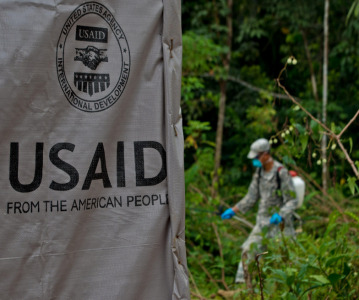Surge of Indian biosimilars market forecast in 2019

India predicted to be one of the world’s ‘fastest growing bio’ hubs in 2019, fuelled by new biosimilars production.
New data from CPHI shows that, despite ongoing reputational challenges, India’s biologics market is set for robust growth in 2019 driven by biosimilars production. The India-specific findings from CPHI’s bio league tables predict strong ‘bio growth potential’ in India throughout 2019 in the build-up to the 13th edition of CPHI India 2019, which will take place at the India Expo Centre in Delhi NCR.
However, highlighting the market’s ambivalent reputation, India also received the second lowest overall scores for ‘quality of biologics manufacturing’ and ‘biologics innovation’. Yet for ‘growth potential’ India (7.05) scored extremely highly, finishing broadly level with the well-established advanced bio markets Germany (7.2), Ireland (7.2) and Japan (7.3), and behind only the US (7.8) – but significantly, ahead of China (6.9) and its widely documented rapidly expanding bio sector.
India’s growing biosimilars industry is the primary driver of growth, with respondents citing ‘India’s rising domestic demand, bio investments and the potential for increased exports to advanced markets’. Already, India has over 70 approved biosimilars in the domestic market (more than any other country) and market penetration – which is currently relatively low – is expected to increase quickly in 2019 as the middle classes increase demand.
This growth potential is augmented by government subsidies for production of biosimilars, expiration of existing biologics patents and India’s Central Drugs Standard Control Organisation aligning guidelines closely with other regulators such as the US FDA. In fact, the Associated Chambers of Commerce of India 2017 report predicts that the biosimilars market in India was worth $2.2bn and is expected to reach an astonishing $40bn by 2030.
Cara Turner, Brand Director, Pharma, commented: “CPHI and P-MEC India have been extremely successful and we announced before the event that India had secured the number one spot for growth potential of small molecules in 2019. These new findings however, show that biosimilars are also set for dramatic growth in 2019 and that India is expected to be amongst the fastest growing bio regions. In fact, over the next few years we anticipate seeing more bio machinery manufacturers attending P-MEC and a steady growth in our bio audiences.”
Demand in Europe and the US is expected to sustain longer term growth rates as these markets open-up further to biosimilar encroachment and encourage new entrants. Undoubtedly, the lower cost of manufacturing in India makes biosimilars exports attractive to Western markets. Initial market entry may be slowed by high clinical development costs – which can be as much as $150million for an approval in the US. As a result, it is predicted that in 2019 we will see a greater number of Western-Indian partnerships (aka the Mylan-Biocon model) jointly bringing new biosimilars to patients in both the EU and US.
The research highlighted that unlike its small molecule industry – which improved rapidly in the 2018 league tables – the bio industry in India is still viewed by international pharma as substantially behind the leading markets in terms of quality and innovation. Notably, the top ranked nations of the US, Germany, and Japan, and the second tier of advanced nations, Sweden, Ireland, Switzerland, the UK, France and Korea.
The relatively low score for both quality (6.0) and innovation (6.0) is probably reflective of the lack of any patented biologic development in India, with the majority of this work being retained in Europe and the US. However, the nation did score intermediately for ‘knowledge of its bio professionals’ (6.6) and its ‘ability to meet future capacity requirements’ (6.7) – suggesting that there is more than adequate facilities built or under construction to meet rising future demand.
After the huge success of the 2018 event, CPHI & P-MEC India 2019 will be returning to the India Expo Centre in the nation’s capital for the second time and Rahul Deshpande, Group Director, UBM India added; “What is most exciting is that we’ll be returning to a single site event taking place in the nation’s capital Delhi, bringing together regulators, industry and international pharma in what will have been a record-breaking year for the pharma industry in India. ”
Related News
-
News US FDA adds haemodialysis bloodlines to devices shortage list
On March 14, 2025, the US FDA published an open letter to healthcare providers citing continuing supply disruptions of haemodialysis bloodlines, an essential component of dialysis machines. -
News Women in Pharma: Manufacturing personal and team success
Our monthly Women in Pharma series highlights the influential lives and works of impactful women working across the pharmaceutical industry, and how the industry can work towards making the healthcare industry and workplace more equitable and inclusive... -
News Pfizer may shift production back to US under Trump pharma tariffs
At the 45th TD Cowen annual healthcare conference in Boston, USA, Pfizer CEO Albert Bourla outlined the potential for Pfizer to shift its overseas drug manufacturing back to the US as pharmaceutical industry players weigh their options against Presiden... -
News Experimental drug for managing aortic valve stenosis shows promise
The new small molecule drug ataciguat is garnering attention for its potential to manage aortic valve stenosis, which may prevent the need for surgery and significantly improve patient experience. -
News Women in Pharma: Connecting accessible pharma packaging to patients – a Pharmapack Special
Throughout our Women in Pharma series, we aim to highlight how CPHI events encourage discussions around diversity, equity, and inclusion initiatives in the pharmaceutical industry. -
News Vertex Pharmaceuticals stock jumps as FDA approves non-opioid painkiller
UK-based Vertex Pharmaceuticals saw their stock shares soar as the US FDA signed off on the non-opioid painkiller Journavx, also known as suzetrigine, for patients with moderate to severe acute pain, caused by surgery, accidents, or injuries. -
News Trump administration halts global supply of HIV, malaria, tuberculosis drugs
In various memos circulated to the United States Agency for International Development (USAID), the Trump administration has demanded contractors and partners to immediately stop work in supplying lifesaving drugs for HIV, malaria, and tuberculosis to c... -
News 2024 Drug Approvals: a lexicon of notable drugs and clinical trials
50 drugs received FDA approval in 2024. The centre for biologics evaluation and research also identified six new Orphan drug approvals as under Biologics License Applications (BLAs). The following list picks out key approvals from the list, and highlig...
Position your company at the heart of the global Pharma industry with a CPHI Online membership
-
Your products and solutions visible to thousands of visitors within the largest Pharma marketplace
-
Generate high-quality, engaged leads for your business, all year round
-
Promote your business as the industry’s thought-leader by hosting your reports, brochures and videos within your profile
-
Your company’s profile boosted at all participating CPHI events
-
An easy-to-use platform with a detailed dashboard showing your leads and performance







